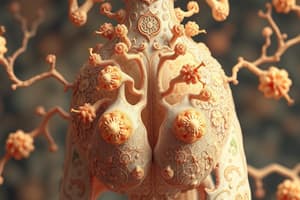Podcast
Questions and Answers
What distinguishes δ-cells from β-cells?
What distinguishes δ-cells from β-cells?
- They are primarily responsible for producing insulin.
- They have larger and less compact granules than β-cells.
- They produce glucagon to increase blood sugar levels.
- They contain smaller and more compact granules than β-cells. (correct)
What role does somatostatin play in the digestive process?
What role does somatostatin play in the digestive process?
- It decreases stomach acid production by inhibiting various hormones. (correct)
- It enhances the absorption of nutrients in the intestine.
- It directly stimulates stomach acid production.
- It increases the release of hormones that speed up digestion.
What is the primary function of PP cells in the pancreas?
What is the primary function of PP cells in the pancreas?
- They produce pancreatic polypeptide which regulates pancreatic secretions. (correct)
- They break down fats for energy.
- They store energy in the form of glycogen.
- They produce insulin to regulate blood sugar levels.
What hormones do thyroid cells produce?
What hormones do thyroid cells produce?
How many main types of adrenal cells are there?
How many main types of adrenal cells are there?
Flashcards are hidden until you start studying
Study Notes
Cell Types and Functions
- δ-cells are characterized by smaller, more compact granules compared to β-cells, indicating a specific role in hormonal production.
- Somatostatin serves as an important hormone that decreases stomach acid secretion by inhibiting the release of gastrin, secretin, and histamine, thereby slowing down the digestive process.
- PP cells (Pancreatic Polypeptide cells) found in the Islets of Langerhans are responsible for producing pancreatic polypeptide, which regulates various pancreatic secretions and digestive processes.
- Thyroid cells located in the thyroid gland produce two key hormones: thyroxine (T4) and triiodothyronine (T3), both of which are crucial for regulating metabolism and energy levels in the body.
- Adrenal cells, residing in the adrenal gland, consist of two distinct types that play vital roles in stress response and metabolic regulation.
Studying That Suits You
Use AI to generate personalized quizzes and flashcards to suit your learning preferences.




